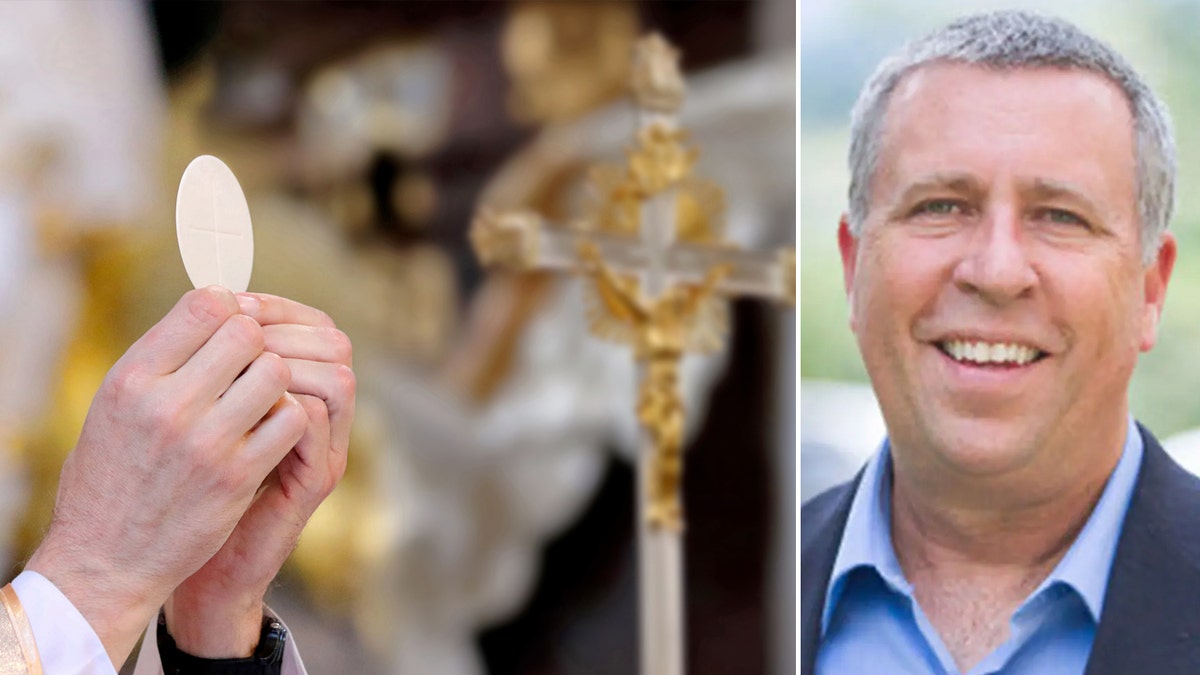Fox News Flash top headlines for August 4
Fox News Flash top headlines are here. Check out what's clicking on Foxnews.com.
"Amen, amen, I say to you, you are looking for me not because you saw signs, but because you ate the loaves and were filled. Do not work for food that perishes, but for the food that endures for eternal life, which the Son of Man will give you. For on him the Father, God, has set his seal" (John 6:26-27).
These verses come from the Gospel of John, one of the four gospel narratives in the New Testament. While the exact authorship is unknown, it is most commonly attributed to the Apostle John, according to the website Catholic Answers.
In these verses, "we find a profound moment that speaks directly to the heart of human desire, the essence of our faith journey," said Curtis Martin, the Colorado-based founder and CEO of the Fellowship of Catholic University Students (FOCUS), a Catholic outreach program on college campuses.
VIRGINIA PASTOR CITES 'PROFOUND' MESSAGE IN PSALM 145 AS 'LIFELINE' IN 'DARKEST TIMES'
The Eucharist, Martin said, "is the real and substantial body, blood, soul and divinity of Christ."
The verses embrace the miracle of the multiplication of the loaves and the fishes and compound on that miracle, Martin said.

The passages in John's Gospel "speak directly to the heart of human desire, the essence of our faith journey," Curtis Martin, founder and CEO of FOCUS, told Fox News Digital. (iStock; FOCUS)
"The crowd, having witnessed and benefited from the miracle of the loaves and fishes, pursues Jesus across the sea," he said.
"Their motives, however, are elevated by Jesus Himself, who challenges them to seek not the perishable food but the food that endures to eternal life."
These verses serve as "a clarion call to all of us," Martin said — and encourage people to "examine why we follow Christ."
SOUTH CAROLINA PRIEST SAYS MESSAGE OF UNITY IN PSALM 133 IS NEEDED NOW MORE THAN EVER
"Are we drawn to Him solely for what He can do for us, or are we genuinely seeking and accepting a relationship with Him?" he said.
"And are we simply going through the motions when we attend church or are we focused on the source and summit – the mystery and miracle of the Eucharist?"

Jesus challenged the crowd "to seek not the perishable food but the food that endures to eternal life," said a faith leader. (iStock)
The directive from Christ to "do not work for food that perishes" should prompt a recentering of a person's focus – "from the temporal to the eternal," Martin said.
"In our culture, where instant gratification is often prioritized, this message is counter-cultural, and it calls us to lift our gaze from the fleeting and fix our eyes on the everlasting," he said.
CLICK HERE TO SIGN UP FOR OUR LIFESTYLE NEWSLETTER
Throughout his work with college students through FOCUS, Martin said he's "encountered countless young people and adults who are searching for meaning and purpose."
Many of these students, he said, "are caught in the whirlwind of academic and societal pressures, social expectations and the pursuit of success as defined by worldly standards."

Many college students today are "caught in the whirlwind" of various societal, social and academic pressures, says a faith leader who runs a program for campuses. (iStock)
"Yet," Martin said, "there remains a deep, often unspoken, hunger for something more."
That hunger, he said, is what Jesus addresses in these verses.
JEWISH PRO-ISRAEL ACTIVIST SAYS WARNINGS IN LEVITICUS A REMINDER THAT GOD IS IN CONTROL
"We find it everywhere we go – the hunger for communion with Him that we can experience in the Eucharist."
These Bible verses, Martin said, "challenge us to prioritize our spiritual nourishment."

The Eucharist is the "source and summit" of the Christian faith, according to a Catholic leader. (Jorge Castellanos/SOPA Images/LightRocket via Getty Images)
"In a world obsessed with material gain and temporary pleasures, Jesus offers an alternative: eternal life through a relationship with Him," he said.
"This passage is a reminder that our true sustenance comes from the bread of life, from Jesus himself."
CLICK HERE TO GET THE FOX NEWS APP
While reflecting on these gospel passages, Christians should ask themselves if they are making time for Jesus each day, as well as ensuring that prayer is a priority.
"Are we refocusing ourselves on the Eucharist and making Jesus a priority in our lives?"
"Are we refocusing ourselves on the Eucharist and making Jesus a priority in our lives? The answers to these questions are critical and will help us stay focused on Jesus throughout every chapter of life," he said.
For more Lifestyle articles, visit www.foxnews.com/lifestyle
"Let us hunger for the bread of life, the Eucharist — and find our fulfillment in Him, who alone can satisfy our deepest desires."
This truth, Martin said, will "not only transform our own lives, but also become beacons of hope and sustenance for a world desperately in need of the bread of life."


